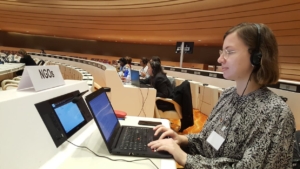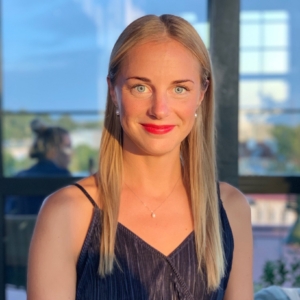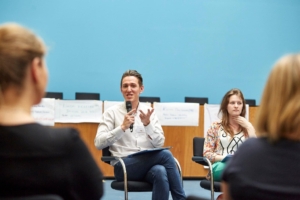“Protection through Mobility: An Emergency Response to Hostility”
From July 2020 the Estonian Network of People Living with HIV (EHPV) is implementing their first Eastern Europe and Central Asia region project- “Protection through Mobility: An Emergency Response to Hostility”. The project goal is to create protection mechanisms and ensure access to healthcare services according to the highest attainable standards of physical and mental health for MSM and trans people, including those HIV+, who experienced SOGI-based state-sponsored prosecutions in the Caucasus region of Russia, as well as Turkmenistan and Uzbekistan.
Erika! You are the great mind behind the project. Please, tell us how the project idea emerged and why it is important for you?

Back in early 2019, during the second wave of prosecutions of gay man in Chechnya, my colleagues and I started brainstorming on what could we do on this matter, how can we be helpful. Unfortunately, it turned out that planned development programmes aiming to improve the well-being of LGBTQ communities in the EECA region could not fit in rather costly unplanned activities to provide sufficient support to those in need of emergency assistance in potentially life-threatening environments. This put me think that an emergency-oriented project is needed, in order to be able to contribute to the safety and security of LBGTQ people in the region in a meaningful and timely manner.
Having worked in/with all Central Asian countries on different social matters, including LGBTQ-specific issues, I was aware that despite rather unfavourable legal and social environments for the communities in most of the Republics, like exposure to stigma and state-sponsored discrimination, as well as a lack of legal protection mechanisms, the two countries with the most difficult situation are Turkmenistan and Uzbekistan. The criteria is simple: Turkmen and Uzbek governments and legal systems still consider homosexuality to be a crime leading to imprisonment as a punishment.
Therefore, with help of my colleagues, I decided to create a project that would enable the project team to provide an emergency response to hostility for those LGBTQ people residing in particularly high-risk environments. In order to make this concept more nuanced and work not only towards the safety of individuals experiencing hostility already, but also to contribute to improvements of the environments in focus, an advocacy part was introduced. By carries out the planned advocacy activities, we, the project team, plan to move forward with decriminalising homosexuality in Turkmenistan and Uzbekistan, as well us to showcase the situation in Turkmenistan and Uzbekistan, and in particular in Chechnya, to the international community which can later pressure respective governments to create more inclusive legislations.
Karolin, you are the project coordinator. Please, tell us how the project goals will be achieved and why you are part of this project team?

The project goal will be achieved by unveiling and spreading information on lawful migration channels from a beneficiary’s country of residence (Russia, Turkmenistan, or Uzbekistan) to Estonia by advocating for granting entry visas to Estonia on humanitarian grounds. Respective cases of human rights violations would be documented upon arrival and applied in advocacy for improving legal and factual environments in respective countries by submitting alternative reports to UN treaty bodies. Access to HIV and other healthcare services for displaced MSM and trans people would be improved by creating a clear and state-approved procedure for gaining access to antiretroviral therapy in Estonia for newly arrived MSM and trans people.
The question: “Why am I part of the project team?” has quite a simple answer. Because I want to work with a topic close to my heart. My professional interest is primarily the topic of refugees. In the summer of 2019, I graduated Tal Tech master’s degree in International Relations and European-Asian Studies Cum Laude, where my master’s thesis studied the possibility of granting legal refugee status to persons forcibly displaced by climate change under the UN Convention Relating to the Status of Refugees. I have worked with immigrants and refugees in Estonia at the Harku Detention Center as a recreation specialist, in the media team at the Yaffa cultural centre in Balata Refugee Camp in Palestine, as a training coordinator at the NGO Johannes Mihkelson Center in the project „Meie Eesti: inimesed, kohad, helid, maitsed“ and at the moment I work as a project coordinator in NGO Tartu International House project „Uued lapsed koolis: uussisserändajatega seotud väljakutsed Eesti koolides ja kohanemise toetamine“. I have been supporting the integration process of immigrants in Estonia for several years. However, I am interested not only on supporting the integration process of immigrants in Estonia but to focus on the legal bases and procedures for granting refugee status in Estonia and to stand up for equal rights and fair treatment for everyone. This project allows me to do just that.
Yuri, you are working in this project as an advocacy advisor in the human rights field. Please, tell us why this project is important and why you decided to support it with your expertise?

For over three years I have been working at ECOM – Eurasian Coalition on Health, Rights, Gender and Sexual Diversity as Human Rights and Legal Issues Coordinator. Together with the team I work every day to create enabling legal and social environment conducive of the right to health in EECA, where every and each gay men or trans* persons can fully enjoy their rights and freedoms. Unfortunately, countries like Uzbekistan, Turkmenistan and Russian Federation are the toughest to work with, and we need to put double- or even triple efforts compared to other countries, if we want to achieve some feasible results related to positive legislative changes there.
My experience shows that international advocacy remains one of the most powerful source of those changes in project countries, therefore, I’ve decided to join the team and advice on how to use such instruments as UPR (Universal Periodic Review) and UN Treaty Bodies to strengthen the already powerful interventions of “Protection through Mobility” project team. At the end of the day, we are all working to achieve the same goal – to make this world a better place to those who identify as LGBTQI. Therefore, I am in.
The first HIV case in Estonia was diagnosed in 1988, and by December 31st, 2019 a total of 10,079 HIV cases have been reported1. Men who have sex with men (MSM) and transgender people have been identified as the groups most at risk of HIV infection by the WHO2. 2018 HIV surveillance data from EU/EEA countries indicates that sex between men accounted for the largest proportion of all new HIV diagnoses in 2018 – 40%3. It is estimated that there are up to 9,000 homo- and bisexual men in Estonia4. Sexual risk behaviors are common, for example half of the MSM do not use condoms consistently in casual relationships, and this has not changed in 7 the last 10 years5. HIV prevalence among MSM is estimated to be 2–4% and it has been stable in the last years6.
EHPV is an organization promoting communities living with HIV. Their goal is to increase via effective partnership and active advocacy efforts the influence of the PLHIV community on improving access to timely, comprehensive and quality treatment, care and support for adults and children living with HIV in EECA countries.
